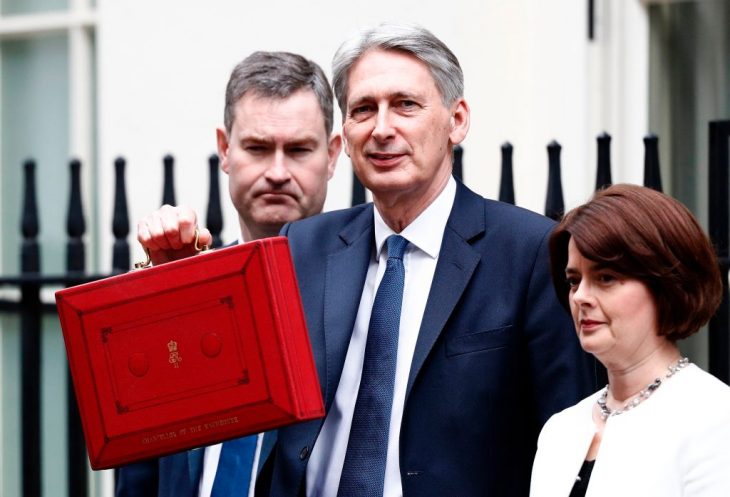Philip Hammond is feeling the heat this morning. This was supposed to be the ‘boring’ budget, with no headline-grabbing announcements or spending splurges. Instead, the Chancellor’s face is splashed across the front pages this morning for all the wrong reasons. And the reception for Hammond doesn’t get any warmer inside the newspapers.
The Daily Mail starts its commentary with some praise for the Chancellor. It says that his Budget ‘was a million miles from the panic-stricken emergency Budget’ put forward in the run-up to the referendum by his predecessor. Gone was the ‘anxiety’ about the future of Britain’s economy; and in came the jokes – gags the Chancellor could afford with a ‘flailing opposition’, ‘unemployment..at an 11-year low’, under control inflation and rosy-looking forecasts, says the Mail. But that doesn’t stop this from being a ‘deeply uninspiring’ Budget, argues the Mail, which says it is hard to forgive Hammond’s bid to hide his tax hikes. Indeed, his National Insurance rate rise for the self-employed is a ‘a naked breach of a manifesto pledge not to raise rates’. Amidst rising insurance premiums and falling tax-free allowances for shareholders and directors, the Mail says it fears that Hammond ‘simply doesn’t understand the hard-working, self-reliant, risk-taking self-employed who are his party’s core supporters’. The Mail concludes its editorial with a clear message for the Chancellor: ‘Breaking a manifesto pledge to them was not a judicious move’.
Hammond’s National Insurance rate rise for the self-employed is a ‘terrible way to Phil the coffers’, says the Sun, which calls the policy a ‘raid on the wages of self-employed White Van Men’. As with the Mail, the paper does find some warm words for the Chancellor; ‘we like’ him, but that doesn’t stop the policy which has hit the headlines from being a ‘misguided’ idea that goes after ‘Britain’s army of strivers’, the paper argues. Given that Theresa May has vowed to stick up for the ‘just about managing’, how does a move that means ‘three million will pay an extra £240 a year on average’ square with that? It’s clear that ‘many firms save money rehiring staff as self-employed contractors’. So Hammond should go after them – not ‘hammer’ ‘all self-employed workers’, says the Sun.
‘There was a retrograde feel to this Budget’, says the Daily Telegraph, which says the ‘political rationale’ behind yesterday’s announcement was ‘little different from that of the Brown/Osborne era’. The paper says that the National Insurance rate rise is a ‘case in point’; it says that Hammond has taken the Labour approach – raise taxes to ‘equalise’ the gap between the employed and the self-employed – rather than opt for a Tory way of doing things: ‘seek to close the gap by reducing taxes’. The difference between the Conservatives and the centre left has ‘become increasingly blurred in recent years,’ says the Telegraph, which suggests that ‘Theresa May and her Chancellor seem intent on moving on to the territory that the Blairites once occupied’. This ‘won’t suffice’ after Brexit, warns the Telegraph, which argues that viewing the self-employed as those who are deliberately trying to ‘deny the Treasury cash’ ‘is to fight the political argument on the centre Left’s ground.’. The Telegraph should remember a simple point: ‘many people are self-employed not through choice but circumstance’. The Tories are also brewing trouble for themselves, says the Telegraph; after all, ‘this will be resented by the very people who by and large look to the Tories for support’.
The Guardian says that there is a difference between yesterday’s Budget and the ones we would have seen under Gordon Brown – ‘Gone were the…giveaways and gimmicks designed to win favourable headlines,’ says the Guardian. And given how much of what was announced yesterday was already known, you’d be forgiven for being bored, says the Guardian. But don’t be fooled: ‘there was serious politics on display’. It describes the decision to up NI rates as a ‘break with conventional Conservative ideology’, saying that the move was a ‘repudiation of a Thatcherite myth that the self-employed were all entrepreneurs’. Given how many more people are now self-employed, the Chancellor was right to correct some of the imbalance. The paper goes on to say that it’s something of a myth to see the self-employment boom is as a result of a ‘wave of risk-taking businesses’. Instead, ‘we have seen jobs created at the taxpayer’s expense’. Hammond has clearly been ‘courageous’ with this policy. But he should now go further: the ‘next step would be to go after the companies who use self-employment as a way of dodging national insurance’, says the Guardian.
Philip Hammond’s ‘only notable tax reform was politically risky,’ says the Times, which suggests the National Insurance rate rise ‘sits ill with his goal of making Britain ‘the best place in the world to start and grow a business’’. It’s true that some have been using the self-employed loophole to try and ‘game the system to pay less tax’. But this change also risks tangling up many other business owners ’who are the foundation of an entrepreneurial culture that any Conservative government should be careful to incentivise, not penalise’. The Chancellor is also right to make the point that ‘few self-employed people will be substantially worse off’. After all, the reforms ‘will hardly touch lower earners’; while for business owners, a ‘steady fall in corporation tax’ touted yesterday will undoubtedly help.







Comments